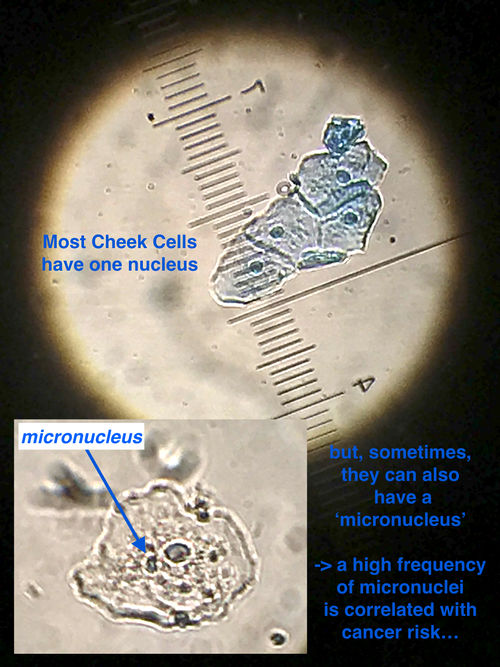20180331 Workshop DNAdamage
Workshop: Open-sourcing DNA damage detection for Citizen Science
Saturday, April 21 at 2 PM - 5:30 PM
To Note: DATE CHANGED to avoid Interference with other Holidays.
Hackuarium
c/o UniverCité, Ch. du Closel 5, 1020 Renens, Vaud
Tickets (2 for 1, to Do It Together!) Available via eventbrite.com
Please share this:
Facebook event .
française en dessous ***
Bring along your toothbrush to gently collect your own cheek cells and assess baseline levels of DNA damage during this half-day workshop. Bring a friend, or partner up with another participant, and you will each prepare slides of your own cheek cells, then swap off for scoring. Under the microscope you will count your cells and observe their nuclei. If a big piece of chromosome has broken off in your cell, occasional micronuclei can be found. Some micronuclei are entirely normal (maybe 5 in 1000), but too many (maybe 50 or more in 1000) might mean you should consider whether you are being exposed to genetic risk factors.
Hackuarium is about open citizen science, and Rachel Aronoff (who is an experienced molecular biologist and geneticist with two active projects around a big picture concept of 'genomic integrity' currently in progress at Hackuarium) can help show how you can become part of it. Learn about quantitative methods essential for informative experiments, better understand the statistical challenges for interpretation of results and potentially realise how choices made about environmental risks might influence health.
Do It Together!
Au cours de cet atelier d'une demi-journée, vous pourrez évaluer les niveaux de dommages de votre ADN après avoir récolté doucement vos propres cellules buccales à l’aide d’une brosse à dent.
Vous travaillerez en binôme – accompagné(e) d’un autre participant du workshop ou d’un(e) ami(e) que vous avez la possibilité de faire profiter de l’atelier avec vous – et préparerez des lames de vos propres cellules pour les regarder sous le microscope. Vous pourrez ainsi compter les cellules et observer leur noyau. Lors de cette analyse au microscope vous apprendrez à repérer « des micronoyaux ». Si un gros morceau de chromosome s'était cassé dans votre cellule, des micronoyaux occasionnels peuvent être trouvés. Il est tout à fait normal d’en détecter un petit nombre (peut-être 5 sur 1000), un nombre trop important (peut-être 50 sur 1000) pourrait signifier que vous êtes potentiellement exposé(e) à des facteurs de risque génétiques.
Hackuarium est un laboratoire public de science citoyenne ouverte. Rachel Aronoff est biologiste moléculaire et généticienne. Elle mène actuellement deux projets à Hackuarium, tous deux liés au concept global d’«intégrité génomique». Si vous êtes intéressé(e), Rachel vous expliquera avec plaisir comment vous pouvez rejoindre ces projets pour notamment : mieux connaître les méthodes quantitatives essentielles aux les expériences informatives, mieux comprendre les défis statistiques pour l'interprétation des résultats et finalement mieux réaliser comment les risques environnementaux influencent la santé.
Travaillons ensemble!
IMPORTANT : Pour la récolte des cellules, veuillez apporter une brosse à dent. Un(e) accompagnant(e) de votre choix est le(a) bienvenu(e) pour participer avec vous à l’atelier.
The basic micronuclei protocol has already been shared in the wiki!
Here is the Prezi presented at the workshop, with background on what micronuclei are, and how to find them...
Try it yourself, with the help of Rachel Aronoff!!
